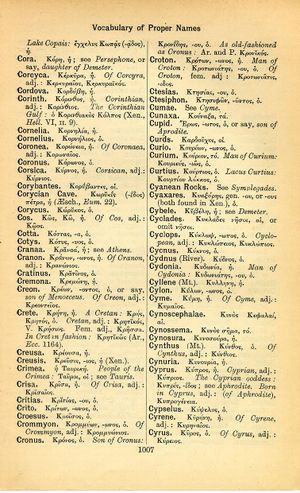Corsica: Difference between revisions
Περὶ τοῦ ἐπέκεινα τοῦ νοῦ κατὰ μὲν νόησιν πολλὰ λέγεται, θεωρεῖται δὲ ἀνοησίᾳ κρείττονι νοήσεως → On the subject of that which is beyond intellect, many statements are made on the basis of intellection, but it may be immediately cognised only by means of a non-intellection superior to intellection
m (Text replacement - "link={{" to "link={{") |
m (Text replacement - "}}]]" to "}}]]") |
||
| Line 1: | Line 1: | ||
{{WoodhouseENELnames | {{WoodhouseENELnames | ||
|Text=[[File:woodhouse_1007.jpg|thumb | |Text=[[File:woodhouse_1007.jpg|thumb | ||
|link={{filepath:woodhouse_1007.jpg | |link={{filepath:woodhouse_1007.jpg}}]][[Κύρνος]], ἡ. | ||
<b class="b2">Corsican</b>, adj.: Κύρνιος. | <b class="b2">Corsican</b>, adj.: Κύρνιος. | ||
Revision as of 10:09, 15 August 2017
English > Greek (Woodhouse)
Κύρνος, ἡ.
Corsican, adj.: Κύρνιος.
Latin > English (Lewis & Short)
Corsĭca: ae (Corsis, ĭdis, Prisc. Perieg. 470), f. (among the Greeks, Κύρνος, Κορσίς),
I the island Corsica, in the Mediterranean Sea, renowned in ancient times for the honey and wax of wild bees; the place of banishment of Seneca the philosopher, Liv. Epit. 17; Sen. Cons. Helv. 6, 2; Tac. H. 2, 16; Mel. 2, 7, 19; Plin. 3, 6, 12, § 80; Monum. Scip. ap. Inscr. Orell. 552; Cic. N. D. 3, 20, 52 al.—
II Hence adjj.
A Cor-sus, a, um, Corsican, Ov. F. 6, 194.—In plur.: Corsi, ōrum, m., the Corsicans, Liv. 42, 7, 1 and 2; Plin. 15, 29, 38, § 126.— Also, a people that migrated from Corsica into northern Sardinia, Plin. 3, 7, 13, § 85. —
B Corsĭcus, a, um, Corsican: litora, Manil. 4, 636: apis, Ov. Am. 1, 12, 10: mel, Plin. 30, 4, 10, § 28: cera, id. 21, 14, 49, § 84. —
C Corsĭcānus, a, um, Corsican: ager, Sol. 3: mella, Serv. ad Verg. E. 9, 30; id. G. 4, 101.
Latin > French (Gaffiot 2016)
Corsĭca,¹⁴ æ, f., Plin. 8, 199, et Corsis, ĭdis, f., Prisc. Perieg. 471, la Corse || Corsus, a, um, Ov. F. 6, 194, Corsĭcus, a, um, Varro R. 3, 2, et Corsĭcānus, a, um, Serv. Georg. 4, 101, de Corse || Corsī, ōrum, m., les Corses : Liv. 42, 7, 1 ; Plin. 15, 126.
Latin > German (Georges)
Corsica, ae, f. (bei den Griechen Κύρνος, auch Κορσίς [Dionys. perieg. 459], dah. auch lat. Corsis, idis, f., Prisc. perieg. 471), die Insel Korsika im Mittelmeere, bekannt durch den bitteren Honig der dort in Menge hausenden wilden Bienen, Verbannungsort des Philos. Seneka, Liv. epit. 17. Sen. ad Helv. 6, 2. Tac. hist. 2, 16. Corp. inscr. Lat. 1, 32. lin. 5 (wo Corsica = Corsicam); vgl. Voß Verg. ecl. 9, 30. – Dav.: A) Corsus, a, um, korsisch, aquae, das um Korsika gelegene Meer, Ov.: Plur. subst., Corsī, ōrum, m., die Bewohner von Korsika, die Korsen, Liv. u.a. – vulg. Cursi, Corp. inscr. Lat. 3, 1151 u. 1153. – B) Corsicus, a, um, korsisch, Ov. u.a. – C) Corsicānus, a, um, korsisch, Solin. u.a.: Nbf., natione Cursicanus, Corp. inscr. Lat. 2, 4063.

